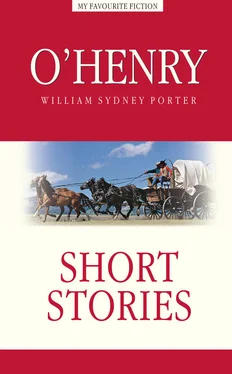“Let us sit on this log at the roadside,” says I, “and forget the inhumanity and ribaldry of the poets. It is in the glorious columns of ascertained facts and legalized measures that beauty is to be found. In this very log we sit upon, Mrs Sampson,” says I, “is statistics more wonderful than any poem. The rings show it was sixty years old. At the depth of two thousand feet it would become coal in three thousand years. The deepest coal mine in the world is at Killingworth, near Newcastle. A box four feet long, three feet wide, and two feet eight inches deep will hold one ton of coal. If an artery is cut, compress it above the wound. A man’s leg contains thirty bones. The Tower of London was burned in 1841.”
“Go on, Mr Pratt,” says Mrs Sampson. “Them ideas is so original and soothing. I think statistics are just as lovely as they can be.”
But it wasn’t till two weeks later that I got all that was coming to me out of Herkimer.
One night I was waked up by folks hollering “Fire!” all around. I jumped up and dressed and went out of the hotel to enjoy the scene. When I seen it was Mrs Sampson’s house, I gave forth a kind of yell, and I was there in two minutes.
The whole lower story of the yellow house was in flames, and every masculine, feminine, and canine in Rosa was there, screeching and barking and getting in the way of the firemen. I saw Idaho trying to get away from six firemen who were holding him. They was telling him the whole place was on fire downstairs, and no man could go in it and come out alive.
“Where’s Mrs Sampson?” I asks.
“She hasn’t been seen,” says one of the firemen. “She sleeps upstairs. We’ve tried to get in, but we can’t, and our company hasn’t got any ladders yet.”
I runs around to the light of the big blaze, and pulls the Handbook out of my inside pocket. I kind of laughed when I felt it in my hands – I reckon I was some daffy with the sensation of excitement.
“Herky, old boy,” I says to it, as I flipped over the pages, “you ain’t ever lied to me yet, and you ain’t ever throwed me down at a scratch yet. Tell me what, old boy, tell me what!” says I.
I turned to “What to do in Case of Accidents,” on page 17.
I run my finger down the page, and struck it. Good old Herkimer, he never overlooked anything! It said:
SUFFOCATION FROM INHALING SMOKE OR GAS – There is nothing better than flaxseed. Place a few seed in the corner of the eye.
I shoved the Handbook back in my pocket, and grabbed a boy that was running by “Here,” says I, giving him some money, “run to the drug store and bring a dollar’s worth of flaxseed. Hurry, and you’ll get another one for yourself. Now,” I sings out to the crowd, “we’ll have Mrs Sampson!” And I throws away my coat and hat.
Four of the firemen and citizens grabs hold of me. It’s sure death, they say, to go in the house, for the floors was beginning to fall through.
“How in blazes;” I sings out, kind of laughing yet, but not feeling like it, “do you expect me to put flaxseed in a eye without the eye?”
I jabbed each elbow in a fireman’s face, kicked the bark off of one citizen’s shin, and tripped the other one with a side hold.
And then I busted into the house. If I die first I’ll write you a letter and tell you if it’s any worse down there than the inside of that yellow house was; but don’t believe it yet. I was a heap more cooked than the hurry-up orders of broiled chicken that you get in restaurants. The fire and smoke had me down on the floor twice, and was about to shame Herkimer, but the firemen helped me with their little stream of water, and I got to Mrs Sampson’s room. She’d lost conscientiousness from the smoke, so I wrapped her in the bed clothes and got her on my shoulder. Well, the floors wasn’t as bad as they said, or I never could have done it – not by no means.
I carried her out fifty yards from the house and laid her on the grass. Then, of course, every one of them other twenty-two plaintiffs to the lady’s hand crowded around with tin dippers of water ready to save her. And up runs the boy with the flaxseed.
I unwrapped the covers from Mrs Sampson’s head. She opened her eyes and says, “Is that you, Mr Pratt?”
“S-s-sh,” says I. “Don’t talk till you’ve had the remedy.”
I runs my arm around her neck and raises her head, gentle, and breaks the bag of flaxseed with the other hand; and as easy as I could I bends over and slips three or four of the seeds in the outer corner of her eye.
Up gallops the village doc by this time, and snorts around, and grabs at Mrs Sampson’s pulse, and wants to know what I mean by any such sandblasted nonsense.
“Well, old Jalap and Jerusalem oak seed,” says I, “I’m no regular practitioner, but I’ll show you my authority, anyway.”
They fetched my coat, and I gets out the Handbook. “Look on page 117,” says I, “at the remedy for suffocation by smoke or gas. Flaxseed in the outer corner of the eye, it says. I don’t know whether it works as a smoke consumer or whether it hikes the compound gastro-hippopotamus nerve into action, but Herkimer says it, and he was called to the case first. If you want to make it a consultation, there’s no objection.”
Old doc takes the book and looks at it by means of his specs and a fireman’s lantern.
“Well, Mr Pratt,” says he, “you evidently got on the wrong line in reading your diagnosis. The recipe for suffocation says: ‘Get the patient into fresh air as quickly as possible, and place in a reclining position.’ The flaxseed remedy is for ‘Dust and Cinders in the Eye,’ on the line above. But, after all —
“See here, ” interrupts Mrs Sampson, “I reckon I’ve got something to say in this consultation. That flaxseed done me more good than anything I ever tried.” And then she raises up her head and lays it back on my arm again, and says: “Put some in the other eye, Sandy dear.”
And so if you was to stop off at Rosa to-morrow, or any other day, you’d see a fine new yellow house with Mrs Pratt, that was Mrs Sampson, embellishing and adorning it. And if you was to step inside you’d see on the marble-top centre table in the parlor, “Herkimer’s Handbook of Indispensable Information,” all rebound in red morocco, and ready to be consulted on any subject pertaining to human happiness and wisdom.
The Princess and the Puma
There had to be a king and queen, of course. The king was a terrible old man who wore six-shooters and spurs, and shouted in such a tremendous voice that the rattlers on the prairie would run into their holes under the prickly pear. Before there was a royal family they called the man “Whispering Ben.” When he came to own 50,000 acres of land and more cattle than he could count, they called him O’Donnell “the Cattle King.”
The queen had been a Mexican girl from Laredo. She made a good, mild, Coloradoclaro wife, and even succeeded in teaching Ben to modify his voice sufficiently while in the house to keep the dishes from being broken. When Ben got to be king she would sit on the gallery of Espinosa Ranch and weave rush mats. When wealth became so irresistible and oppressive that upholstered chairs and a centre table were brought down from San Antone in the wagons, she bowed her smooth, dark head, and shared the fate of the Danaé.
To avoid lèse majesté [20]you have been presented first to the king and queen. They do not enter the story, which might be called “The Chronicle of the Princess, the Happy Thought, and the Lion that Bungled his Job.”
Josefa O’Donnell was the surviving daughter, the princess. From her mother she inherited warmth of nature and a dusky, semi-tropic beauty. From Ben O’Donnell the royal she acquired a store in intrepidity, common sense, and the faculty of ruling. The combination was worth going miles to see. Josefa while riding her pony at a gallop could put five out of six bullets through a tomato-can swinging at the end of a string. She could play for hours with a white kitten she owned, dressing it in all manner of absurd clothes. Scorning a pencil, she could tell you out of her head what 1545 two-year-olds would bring on the hoof, at $8.50 per head. Roughly speaking, the Espinosal Ranch is forty miles long and thirty broad – but mostly leased land. Josefa, on her pony, had prospected over every mile of it. Every cow-puncher on the range knew her by sight and was a loyal vassal. Ripley Givens, foreman of one of the Espinosal outfits, saw her one day, and made up his mind to form a royal matrimonial alliance. Presumptuous? No. In those days in the Nueces country a man was a man. And, after all, the title of cattle king does not presuppose blood royal. Often it only signifies that its owner wears the crown in token of his magnificent qualities in the art of cattle stealing.
Читать дальше
Конец ознакомительного отрывка
Купить книгу












